
|
![]()
Greatest Films of the 1980s
1980 | 1981 | 1982 | 1983 | 1984 | 1985 | 1986 | 1987 | 1988 | 1989
Title Screen Film Genre(s), Title, Year, (Country), Length, Director, Description 

The Accidental Tourist (1988), 121 minutes, D: Lawrence Kasdan
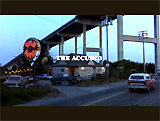

The Accused (1988), 111 minutes, D: Jonathan Kaplan
This thoughtful, fact-based drama was based on a real-life incident of a 1983 rape in New Bedford, Massachusetts. It provided a provocative look at how the justice system treated victims who were often seen as worthy of blame. In mid-April 1987, Sarah Tobias (Jodie Foster in an Oscar-winning role), a sexily-dressed, drunk, working-class patron was in The Mill, a seedy roadside bar, following a fight with her live-in boyfriend Larry (Tom O'Brien) - he was a drug dealer and would-be musician. A bruised, still-intoxicated and half-dressed Sarah ran barefoot and screaming from the roadside bar where she'd just been raped by three men on a pinball machine. Prosecuting Deputy D.A. Kathryn Murphy (Kelly McGillis) took the case, and thought her only chances were a plea bargain with the brutal gang-rapists. She knew she couldn't get a conviction, because Sarah would be unfairly accused of enticing her attackers: "Raped? She f--ked a bar full of guys then she turns round and blames them for it?" The three rapists agreed to plea guilty to "reckless endangerment" instead of rape, with a lesser sentence of no more than 9 months in jail. They were Danny (Woody Brown), Bob Joiner (Steve Antin), and Kurt (Kim Kondrashoff). To satisfy Tobias who disagreed vehemently with her tactics and felt betrayed, Murphy further pursued the case by prosecuting three of the onlooking bystanders for "criminal solicitation" - for inciting or encouraging others to commit a crime. However, she was unsupported by DA Paul Rudolph (Carmen Argenziano). College-frat student Kenneth Joyce (Bernie Coulson) was the key witness who saw the rape (and had watched the encouraging bystanders), but was initially reluctant to testify. He then agreed since his testimony was the crux of the case. He had called 911, but did not personally intervene during the incident. The entire rape episode was voyeuristically envisioned during the lengthy witness recounting (on Sarah's behalf), describing how the three barflies cheered on the rapists. Murphy presented a forceful court argument against the men who encouraged the rape of her client: "These three men did worse than nothing. They cheered, and they clapped, and they rooted the others on. They made sure that Sarah Tobias was raped, and raped, and raped. Now you tell me, is that nothing?" The three who were convicted: Cliff 'Scorpion' Albrect (Leo Rossi), Matthew Haines (Andrew Kavadas), and Stu Holloway (Tom McBeath).

Akira (1988, Jp.), 124 minutes, D: Katsuhiro Otomo



Big (1988), 104 minutes, D: Penny Marshall
Director Penny Marshall's body transference and "fish-out-of-water" fantasy told about a 13 year-old boy in the body of a 30 year-old man. In a carnival scene one evening, teenaged 13 year Josh Baskin (David Moscow) approached toward an automated, wish-granting machine known as "Zoltar Speaks"; after inserting 25 cents, suddenly Zoltar became animated with glowing red eyes and a sign lit up: ZOLTAR SAYS - MAKE YOUR WISH. He made a wish to be 'big' ("I wish I were big"). He received a card - from the strangely unplugged machine - telling him: "Your Wish is Granted" but didn't feel anything different. The next morning, Josh became panicked when he realized, in front of his bathroom mirror, that he was a full-grown, unrecognizable young adult male (now Tom Hanks as a 30 year-old). His freaked-out mother (Mercedes Ruehl) didn't recognize him and thought he was an intruder-kidnapper. Fortunately, at his school, he was able to convince Billy Kopecki (Jared Rushton), his next-door neighbor and best friend, of his predicament. The two rode together on a bus to New York City, and slept in a flophouse. Josh successfully applied for a computer operator data-entry job at the MacMillan Toy Company, after faking his Social Security number and his resume's work history. While Josh was in the main showroom of an F.A.O. Schwartz toy store on a weekend, he happened to meet the MacMillan Toys company executive boss "Mac" MacMillan (Robert Loggia), and the two enjoyed tap dancing and foot-tapping to the tunes Heart and Soul and Chopsticks on a giant, floor-sized and mounted electronic piano keyboard. Josh was ultimately promoted to toy tester in charge of Product Development; however, his sudden advancement upset top-level co-workers: sexy yuppie toy executive Susan Lawrence (Elizabeth Perkins), and her competitive boyfriend Paul Davenport (John Heard). Josh's humorous experiences in the adult world formed the bulk of the remainder of the story. Josh experienced a confused sexual relationship with Susan when she asked to spend the night with him. Paul's jealous retaliation against Josh for stealing Susan away led to Susan's break up with Paul. During a brief return to his hometown, Josh walked around his neighborhood and school, and noticed younger kids, including his friend Billy, having playful fun - he longed to return to the simple joys of childhood. Eventually, Billy was able to inform Josh of a Zoltar machine at Sea Point Park where he made a wish to become a kid again. Susan followed after him and realized that Josh's earlier confession about his transformation was actually true, and that their relationship would be ending. In the conclusion, Susan drove Josh home, and outside his house she kissed his forehead before they parted ways; there was a poignant final shot of Susan watching Josh, who waved goodbye. He transformed into a 13 year-old boy again (with clothes that now didn't fit him) - he ran toward his home, calling out: "Mom?...I missed you all so much."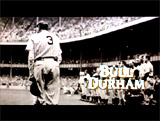


Bull Durham (1988), 108 minutes, D: Ron Shelton
First-time director Ron Shelton, a former second-baser in the minor leagues, had made a prominent career of sports movies that realistically examined the participants' heart, both in terms of sportsmanship and in terms of romance. His writing (and directing) credits have also included: The Best of Times (1986) (football), White Men Can't Jump (1992) (basketball, also directed), Blue Chips (1994) (basketball), Cobb (1994) (baseball, also directed), The Great White Hype (1996) (boxing), Tin Cup (1996) (golf, also directed), and Play It To the Bone (2000) (boxing, also directed). Bull Durham would only receive a single Oscar nomination for Shelton's writing, while Costner's next film would be another baseball film, the mystical Field of Dreams (1989), based on the W.P. Kinsella book. This humorous and intelligent romantic sports comedy-drama about a mediocre North Carolina minor league baseball team (the Durham Bulls) was the quintessential modern sports film of America's greatest game. During the film's opening title credits sequence, cultured and literate baseball and sports groupie Annie Savoy (Susan Sarandon, co-star Robbins' real life 'wife'), a junior-college English teacher and sexually-seductive baseball groupie, provided a lengthy, off-screen speech regarding her beloved team - the Durham Bulls of North Carolina. At the local ball park, Annie observed the new hotshot pitcher for the perennial losing team - the Durham Bulls; making his professional debut was moronic, erratic, dim-bulb young, up-and-coming rookie pitcher-ballplayer Ebby Calvin "Nuke" (or "Meat") LaLoosh (Tim Robbins). 12-year veteran journeyman and minor league baseball catcher "Crash" Davis (Kevin Costner) was being returned to the A-league to mentor and tutor the green young upstart LaLoosh. He had been acquired to teach the clueless LaLoosh (who was being groomed for the major leagues and was worth $100 grand) how to discipline his behavior and improve his concentration, including his erratic pitches. After the game, romantic-minded Crash and Laloosh - in a love triangle - were competing for dating prospects with Annie and her affection, both in a local country-western bar and in Annie's living room, where she proposed to "hook up with one guy a season." Shortly later, she announced her choice for the season - Laloosh - and told Crash: "I'm committed to Nuke for the season. You had your chance the other day." As a way to combat Annie's choice of Nuke for the season, Crash convinced Nuke to rechannel his sexual energy into his pitching and away from her - depriving Annie of sexual fulfillment. Eventually, Annie began to realize that "Crash" might be a better-suited match for her sexual come-ons. She came to Crash's place and offered herself: "I want you," but when he declined, she flatly stated: "This is the damnedest season I've ever seen. I mean, the Durham Bulls can't lose, and I can't get laid." She had a chance to sample his beliefs about three-day long kisses at the conclusion of the film when "Crash" was released from baseball playing altogether (although he might be a minor league manager) and he sought to retire with dignity. He looked up Annie and then over a drink, they kissed, and soon made love. By the end of the film, "Nuke" had been called up and promoted to the majors. Seen one last time and now wearing a T-shirt for the ska-punk band Fishbone, he was being interviewed by TV reporter Raye Anne in a baseball stadium, using words and cliches that Crash had taught him: ("...Anyway, a good friend of mine used to say, 'This is a very simple game. You throw the ball, you catch the ball. You hit the ball. Sometimes you win, sometimes you lose. Sometimes it rains.' Think about that for a while").


Cinema Paradiso (1988, It.) (aka Nuovo Cinema Paradiso), 123 minutes, D: Giuseppe Tornatore
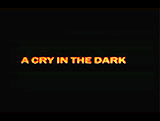

A Cry in the Dark (1988, Australia/US) (aka Evil Angels), 120 minutes, D: Fred Schepisi
The central characters in this docu-drama (a true life story), living in Queensland, Australia, were 7th-Day Adventist Church minister Michael Chamberlain (Sam Neill), his devout and religious wife Lindy (Meryl Streep), and their three children, including 10-week old infant Azaria. In late summer of 1980, the family took a vacation camping trip to the aboriginal sacred spot Ayers Rock in the central Australian outback. During an outdoor nighttime barbecue with other campers, Linda claimed that she saw a dingo (wild dog) carrying off her sleeping baby from their open camping tent. She was frantic: "The dingo took my baby!" After a search, Azaria was never found. After an initial inquest, it was ruled that Lindy's dingo account was true. However, the explosive case caused a media frenzy and unfair witch-hunt, and some theorized that Lindy, who appeared cold-hearted, stoic and emotionless (at the request of her lawyer), had carried on a ritualistic sacrifice of her child by decapitating the baby with a pair of scissors. Michael was found with a small wooden coffin used as a "offering plate" for his parishioners' packs of un-smoked cigarettes, fueling speculation about a sacrifice. The press also published the inaccurate rumor that Azaria meant "sacrifice in the wilderness." When the police questioned Lindy more thoroughly, inconsistencies caused them to suspect her, and the case was reopened as a murder case. Her husband was charged with being an accessory. Ian Baker (Bruce Myles) was the case's prosecutor, while the couple (who testified in their own defense) were represented by Phillips (Neil Fitzpatrick). During the testimony in a second hearing, forensic experts (from London) and other academic experts provided lots of circumstantial evidence, but nothing conclusive. The infant's jumpsuit (with ripped gashes not caused by a dingo) was found in a cave about three miles from the campsite. There was conflicting and confusing evidence presented about the jumpsuit, and about the predatory behavior of dingos. For example, there were traces on infant blood in a camera case and in the family's car, but the causes were unclear. Professor Cameron (Kevin Miles) testified that there were small bloody imprints on the jumpsuit, and that the lack of saliva on the clothing indicated that it wasn't a dingo attack. He was countered by another expert who claimed saliva was present. In an obvious miscarriage of justice (there was no body, no motive, no weapon, and no hard evidence), in October of 1982, Lindy was found guilty of murder and sentenced to a life sentence - with hard labor. Michael was found guilty as an accessory and given an 18-month suspended sentence. Then over three years later, Azaria's outer jacket was found. Lindy was released from prison, and the case was reopened. In 1988, all convictions against Lindy and Michael were overturned.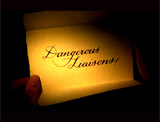



Dangerous Liaisons (1988, US/UK), 120 minutes, D: Stephen Frears
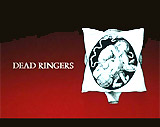

Dead Ringers (1988), 115 minutes, D: David Cronenberg
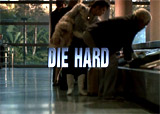

Die Hard (1988), 132 minutes, D: John McTiernan, See Die Hard film series.
Director John McTiernan's action-thriller blockbuster, based on Roderick Thorp's 1979 novel Nothing Lasts Forever, was the first in a series of films stretching over a period of over 20 years, featuring Bruce Willis as wise-cracking, tough-guy NYC police cop John McClane with real human vulnerabilities. There were many breathtaking, tense, nail-biting action sequences in one of the best action films of all-time. Off-duty NYC detective/cop Lt. John McClane (Bruce Willis) took a flight from New York to Los Angeles, arriving on Christmas Eve 1988. He planned to join his estranged wife (of six months who had relocated to LA) Holly Gennero/McClane (Bonnie Bedelia) at a holiday party in her place of business in the 40 story high-rise Plaza Towers in Century City (Los Angeles). He arrived in a limo driven by Argyle (De'voreaux White), and joined the party on the 30th floor, just as a large Pacific Courier truck pulled into the underground garage with a group of heavily-armed, hi-tech terrorists inside, led by classic bad-guy villain Hans Gruber (Alan Rickman), who soon proceeded to take over the building. Long blonde-haired henchman Karl Vreski (Alexander Godunov) shot and killed both the front-desk officer and security guard; a second assailant named Theo (Clarence Gilyard, Jr.), a black technical-computer expert, sealed off the building's exits and entrances, and all but one elevator. The guests at the party were taken hostage, including McClane's wife. The company's executive officer Joe Takagi (James Shigeta) was executed when he refused to reveal the computer's passcodes, to access $640 million dollars in negotiable bearer bonds. Over the next few hours as the terrorists attempted to hack into the vault, McClane evaded capture and pursuit as he attempted to distract the gunmen by attacking some of them individually and sabotaging their plans. During tense cat-and-mouse sequences, the barefooted McClane moved from floor to floor, and navigated through a maze of airducts and the ventilation/elevator shaft. After he finally was able to successfully alert the authorities, the LAPD, SWAT teams, the FBI in helicopters, and a live-mobile news crew arrived at the scene to report on the incident of international terrorism. Momentarily on the roof-top together, McClane confronted Gruber face-to-face, who faked being one of the escaped hostages. After Gruber escaped, McClane suffered bloodied feet after having to walk through shards of sharp glass of the blasted walls. The FBI unwisely ordered city engineers to cut the building's power, releasing the seventh and final "electromagnetic seal" or lock on the vault with the bonds. The double-crossing Gruber was planning to blow the roof with C-4 explosives as an FBI helicopter touched down, to kill the hostages who had been taken there. Then, Gruber's next objective was to escape with the stolen bonds in an emergency vehicle readied for him in the basement. McClane charged up to the roof where he learned that Holly was missing and had been held back by Gruber and taken prisoner on the 30th floor. To save the other hostages, McClane fired a machine gun into the air and ordered them to flee downstairs back to the 30th floor to escape the wired-to-blow roof. He then jumped from the rooftop to escape the high-rise's explosion, while attached to a firehose tied around his waist. Gruber detonated the roof and destroyed one of the FBI helicopters in the process. In the basement, Theo's escape scheme in an emergency ambulance getaway vehicle was thwarted. During a final tense face-to-face showdown, Gruber was holding McClane's estranged wife Holly hostage. McClane distracted Gruber with nervous laughter and suddenly reached behind his back (to get his concealed loaded gun taped to his back with his last two bullets). Gruber was wounded in the shoulder, and the bullet also broke the window behind him. As Gruber stumbled backwards through the broken window pane, he grabbed for Holly's arm and metal Rolex wristwatch-band, nearly dragging her with him. McClane rushed forward and grabbed her, released or unclapsed the band, and watched as Gruber unforgettably fell backwards to his death 30 stories below. Now that the crisis was over, the bloodied and exhausted, McClane joyously kissed Holly. They emerged in front of the building as the final terrorist Karl, thought to be dead, appeared screaming and aiming a machine gun at McClane to ambush him, but he was killed by LAPD Sgt. Al Powell (Reginald VelJohnson). The film concluded with McClane's limo driver Argyle preparing to drive the reunited couple away from the chaos, as they kissed in the limo's back seat.


A Fish Called Wanda (1988), 108 minutes, D: Charles Crichton
Director Charles Crichton's film was one of the cleverest, quirkiest and wittiest madcap caper comedies ever made. It included members of the original anarchic Monty Python troupe with American stars - in a subversive and raucous tale that combined both British and American humor. The film recalled the British Ealing Studio comedies (such as Crichton's own The Lavender Hill Mob (1951) and The Ladykillers (1955)) and Preston Sturges' The Lady Eve (1941). As the tagline stated, the unexpected hit was "a tale of murder, lust, greed, revenge, and seafood," in which three eccentric thieves (Jamie Lee Curtis, Kevin Kline, and Michael Palin) battled the authorities and each other to recover a valuable cache of stolen diamonds. All actors were perfect in their roles, especially the self-absorbed, not-too-bright ("Don't you ever call me stupid") Buddha-misquoting Anglophobe Otto West (Kevin Kline) and the stuttering, animal-loving hitman Ken (Michael Palin). It featured such bits as Ken's attempts to murder an old woman that resulted in the deaths of her dogs (to his horror), Otto's constant tormenting of Ken ("Look! It's K-k-ken coming to k-k-kill me!") and conservative, uptight barrister Archie Leach (John Cleese), and Wanda Gerschwitz's (Jamie Lee Curtis) use of sex to dominate the men in her life and her total arousal to foreign languages like Italian and Russian. The leads would team up again in the comedy Fierce Creatures (1997), in lieu of a sequel.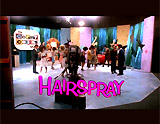

Hairspray (1988), 94 minutes, D: John Waters



Heathers (1988), 102 minutes, D: Michael Lehmann




High Hopes (1988, UK), 110 minutes, D: Mike Leigh


The Last Temptation of Christ (1988), 164 minutes, D: Martin Scorsese
An adaptation of Nikos Kazantzakis' novel, presenting a more fallible human version of Jesus (Willem Dafoe) - a controversial yet provocative possibility.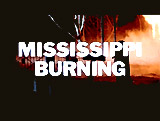


Mississippi Burning (1988), 128 minutes, D: Alan Parker
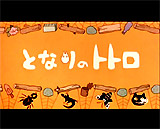

My Neighbor Totoro (1988, Jp.) (aka Tonari no Totoro), 87 minutes, D: Hayao Miyazaki
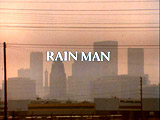


Rain Man (1988), 134 minutes, D: Barry Levinson
Director Barry Levinson's Best Picture-winning drama and bittersweet character study was essentially a comedy road film. Mid-twenties, boastful yuppie California car dealer Charlie Babbitt (Tom Cruise), a fast-talking, slick and ambitious hustler, was in the business of importing expensive sports cars to Los Angeles buyers. His uncaring and insensitive nature was illustrated in his interactions with his pretty Italian secretary/fiancee Susanna (Valeria Golino). When he learned of his estranged wealthy father Sanford Babbitt's death, Susanna was appalled that he was emotionless when he first heard the news and at the Cincinnati, OH funeral. At the reading of the will, Charlie interpreted his father's paltry gift to him of a 1949 Buick Roadmaster convertible and some prize-winning rose bushes as a personal insult. The remainder of the $3 million estate was entered into a trust fund for another secret beneficiary. During a crucial sequence, Charlie explained to Susanna how he was soothed as a younger child (his mother died when Charlie was very young) by an imaginary friend: ("When I was a kid and I got scared, the Rain Man would come and sing to me....You know, one of those imaginary childhood friends"). Charlie traced the beneficiary to Wallbrook, an institution for the mentally disabled. He met one of the high-functioning, autistic-idiot savant patients (with an amazing memory and facility with numbers), named Raymond (Oscar-winning Dustin Hoffman) and realized it was his own older sibling - they were brothers unknown to each other, forgotten and separated at infancy. Raymond had been at the hospital since he was 18 years old (when Charlie was still a two and a half year-old toddler), and Raymond was the other beneficiary - Charlie was told: "He doesn't understand the concept of money." The anxious, idiosyncratic, and self-absorbed Raymond had established many routines in his life, including watching TV programs The People's Court and Jeopardy, and he often recited "Who's On First?" (the famous Abbott and Costello dialogue) if agitated. When denied half of the inheritance, Charlie decided to kidnap his brother (and Susanna returned to LA on her own, due to her frustration with his manipulations). The two brothers were forced to head back to California in the Buick (due to Raymond's fear of flying) - on back roads. Raymond walked with a stiff gait, cocked head, a reliance on routines, and endless chatter. Popular catchphrases were often quoted in his dialogues, such as: "Kmart sucks," "I'm an excellent driver," and "Ten minutes to Wapner." The shallow, selfish, greedy and exasperated Charlie attempted to separate Raymond from the lion's-share of the money, but the memorable six-day cross-country car trip also brought about self-discovery, values reassessment and reconciliation. Their relationship and bond intensified and grew touching as they developed a caring and connected understanding for each other, and Charlie's initial plan to wheel-and-deal his brother to give up the fortune had a change of heart. In particular, after Raymond muttered "Funny Rainman," Charlie realized that his childhood imaginary friend ("Rainman") was actually his brother who comforted him as an infant by singing the Beatles' "I Saw Her Standing There." He also learned the reason for Raymond's institutionalization - he was sent away for nearly scalding young Charlie to death: ("Hot water burn baby"). During their journey, they took at entertaining detour to Las Vegas, where Raymond became an expert at counting cards to win at gambling. Susanna unexpectedly showed up to join them, and she danced with Raymond in an elevator and gave him his first kiss. Once they arrived in Los Angeles, the long-term custody of Raymond with Charlie was discussed. Charlie was offered a check for $250,000 to "just walk away" and allow Raymond to return to the institution. Charlie refused the check - he claimed that his priorities had changed ("It's not about the money anymore") and he wanted to take care of his brother by himself. Ultimately, Charlie realized that Raymond needed round-the-clock institutional care. In their tear-jerking emotional farewell scene at a train station where they parted, the two brothers, now bonded, had touched heads together.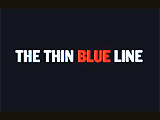

The Thin Blue Line (1988), 101 minutes, D: Errol Morris
This engrossing documentary expose about a gross miscarriage of justice from writer/director film-maker Errol Morris had the intriguing tagline: "A softcore movie, Dr. Death, a chocolate milkshake, a nosey blonde and 'The Carol Burnett Show.' Solving this mystery is going to be murder." [Note: Morris' original intention was to make a documentary about notorious Dallas forensics psychiatrist James Grigson, who had earned the nickname 'Dr. Death' for the number of times his expert testimony had been instrumental in sending defendants to the electric chair.] The crime scene and investigation of a police officer's murder in Dallas, Texas in late November of 1976, was re-enacted in the film. The crime occurred during the Thanksgiving Day weekend in 1976, after 28 year-old drifter Randall Dale Adams (Himself and Adam Goldfine) ran out of gas on the highway. He hitched a ride with 16 year-old teenager David Ray Harris (Himself and Derek Horton) driving a stolen blue compact car (and also having stolen his father's .22 caliber revolver and shotgun). A few hours later (after drinking, smoking pot, and watching two soft-core porno films at a local drive-in), their car was routinely stopped (for not having proper lights) shortly after midnight by Dallas police officers Robert Wood (Ron Thornhill) and Teresa Turko (Marianne Leone). Wood was killed with five shots as he approached the car - it was unclear who had pulled the trigger. Turko (who had cast aside a chocolate milkshake) couldn't confirm conclusively the type of car or its driver. Police were alerted to Harris after he had returned to his small Texas hometown of Vidor, where he bragged about killing "the f--king pig." When police questioned him, he perjured himself and pinned the killing on Randall. About a month after the crime, Adams was arrested and questioned (without a lawyer present), all the while protesting his innocence. He was forced to sign a false confession that he was in the car with Harris, but didn't know what had happened. Assistant District Attorney Doug Mulder charged Adams with the murder, and pushed for the death penalty. Harris escaped with any charges because he was an underage juvenile and couldn't be sentenced to death. Adams was defended by defense attorneys Edith James (Herself) and Dennis White (Himself), while the judge presiding over the case was Donald J. Metcalfe (Himself). During the murder trial, Harris claimed it was Adams who (1) was driving, and (2) shot and killed the officer with the stolen gun under the seat. Harris said he was crouched down in the passenger seat. Other misleading eyewitnesses claimed that Adams was the killer, but Mulder was able to keep their testimony a secret so that they couldn't be cross-examined. Adams calmly contradicted Harris' account. He said he had been dropped off at his motel room at about 9:30 pm, a few hours before the crime, and that he had watched The Carol Burnett Show on TV before going to sleep. Nonetheless, Adams was convicted and sentenced to death in 1977, but his sentence was later commuted to life in prison. As a result of the film, convicted murderer Adams, who had been wrongly imprisoned for twelve years, was finally set free.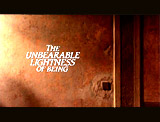



The Unbearable Lightness of Being (1988), 171 minutes, D: Philip Kaufman



The Vanishing (1988, Netherlands/Fr.) (aka Spoorloos), 107 minutes, D: George Sluizer
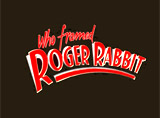


Who Framed Roger Rabbit (1988), 104 minutes, D: Robert Zemeckis
Director Robert Zemeckis' technically-marvelous film blending animated, ink-and-paint cartoon characters and flesh-and-blood live actors, was a convincing comedy/mystery noir thriller set in Los Angeles in 1947. It was very loosely based on Gary Wolf's 1981 novel Who Censored Roger Rabbit? (with comic-book and newspaper strip characters who spoke with word balloons instead of voices) -- in a very sanitized version. Earlier efforts to combine humans and ink-and-paint cartoon characters side-by-side in a film (Disney's Song of the South (1946) and Mary Poppins (1964), for example) were considered primitive next to this film, which used computers to precisely repeat camera movements and calculate shading, to allow them to cast shadows and have complex lighting. Unprecedented cooperation from Warner Brothers and Disney allowed for classic cartoon characters to be seen together for the first time, such as Mickey Mouse and Bugs Bunny parachuting together, having both Tinkerbell and Porky Pig end the movie, and, of course, the famous piano duel between Daffy and Donald Duck in a Cotton Club-style nightclub, the Ink & Paint Club. The film was a delightful spoof of the hard-boiled Sam Spade films and reminiscent of Chinatown (1974), complete with a sultry, femme fatale humanoid Toon named Jessica Rabbit (Kathleen Turner, uncredited, with singing voice by Amy Irving, Amblin Entertainment executive producer Steven Spielberg's wife at the time), and a case involving alleged marital infidelity ("pattycake"), murder, a missing will, blackmail, and a conspiracy hatched by evil, Toon-hating Judge Doom (Christopher Lloyd) (of Cloverleaf Industries). Doom's plan was to bring freeways to LA, thereby ruining the existing Pacific & Electric Red Car public transport electric trolley system. The film revolved around the murder of Marvin Acme (Stubby Kaye), a gag-gift promoter and props supplier (Acme Novelty Co.) for all Toon productions and the owner of the ghetto-ized Toon-town where the Toons, regarded as a segregated minority group, lived just outside Hollywood. Framed for the murder, zany Maroon Cartoon Studios actor Roger Rabbit (Charles Fleischer), a stuttering, disaster-prone 'Toon,' solicited help from reluctant, hard-boiled, boozing private eye Eddie Valiant (Bob Hoskins) to clear his name. Valiant was still grief-stricken over the death of brother Ted by a falling cartoon piano, but was financially - and emotionally - supported by girlfriend Dolores (Joanna Cassidy), as he solved the case.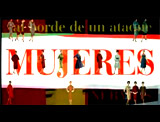


Women on the Verge of a Nervous Breakdown (1988, Sp.) (Mujeres al Borde de un Ataque de 'Nervios'), 90 minutes, D: Pedro Almodóvar
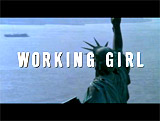


Working Girl (1988), 113 minutes, D: Mike Nichols